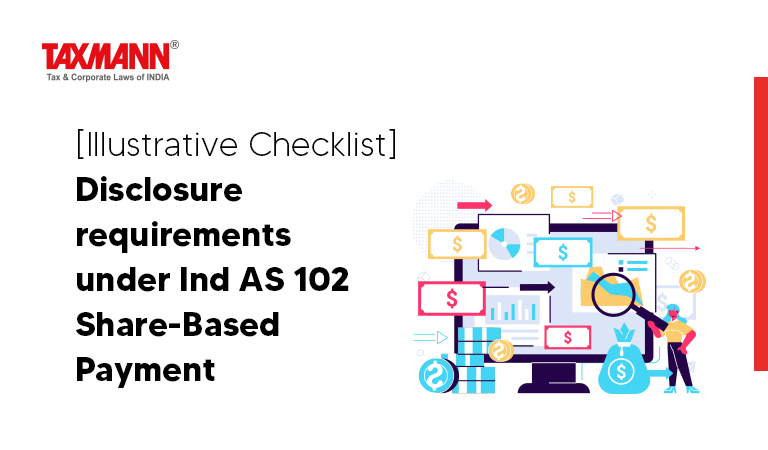[Illustrative Checklist] Disclosure requirements under Ind AS 102 | Share-Based Payment
- Blog|News|Account & Audit|
- 2 Min Read
- By Taxmann
- |
- Last Updated on 9 March, 2023

The objective of Ind AS 102, Share-based Payment, is to specify the financial reporting by an entity when it undertakes a share-based payment transaction. In particular, it requires an entity to reflect in its profit or loss and financial position the effects of share-based payment transactions, including expenses associated with transactions in which share options are granted to employees. This Standard applies to share-based payment transactions in which an entity acquires or receives goods or services. Goods include inventories, consumables, property, plant and equipment, intangible assets and other non-financial assets.
As per the stipulation of this standard, an entity must comply with the below-mentioned disclosure requirements:
I. Whether disclosure of share-based payment arrangements that existed during the period has been provided so as to enable users of financial statements to understand the nature and extent of such transactions
II. Whether a disclosure related to the description of each type of share-based payment arrangement that existed at any time during the period has been provided like
– The general terms and conditions
– Vesting requirements
– The maximum term of options granted
– The method of settlement
III. Whether disclosed the aggregated information for substantially similar types of share-based payment arrangements been provided
IV. Whether the disclosure made for the weighted average share price on the date of exercise made for share options exercised during the period
V. Disclosures for share options outstanding at the end of the period have been done in relation to:
a. Range of exercise prices and weighted average remaining contractual life has been given
b. If the range of exercise prices is wide, the outstanding options is divided into ranges that are meaningful for assessing number and timing of additional shares that may be issued and the cash that may be received upon exercise of those options.
Click Here To Read The Full Story
Disclaimer: The content/information published on the website is only for general information of the user and shall not be construed as legal advice. While the Taxmann has exercised reasonable efforts to ensure the veracity of information/content published, Taxmann shall be under no liability in any manner whatsoever for incorrect information, if any.

Taxmann Publications has a dedicated in-house Research & Editorial Team. This team consists of a team of Chartered Accountants, Company Secretaries, and Lawyers. This team works under the guidance and supervision of editor-in-chief Mr Rakesh Bhargava.
The Research and Editorial Team is responsible for developing reliable and accurate content for the readers. The team follows the six-sigma approach to achieve the benchmark of zero error in its publications and research platforms. The team ensures that the following publication guidelines are thoroughly followed while developing the content:
- The statutory material is obtained only from the authorized and reliable sources
- All the latest developments in the judicial and legislative fields are covered
- Prepare the analytical write-ups on current, controversial, and important issues to help the readers to understand the concept and its implications
- Every content published by Taxmann is complete, accurate and lucid
- All evidence-based statements are supported with proper reference to Section, Circular No., Notification No. or citations
- The golden rules of grammar, style and consistency are thoroughly followed
- Font and size that’s easy to read and remain consistent across all imprint and digital publications are applied



 CA | CS | CMA
CA | CS | CMA
